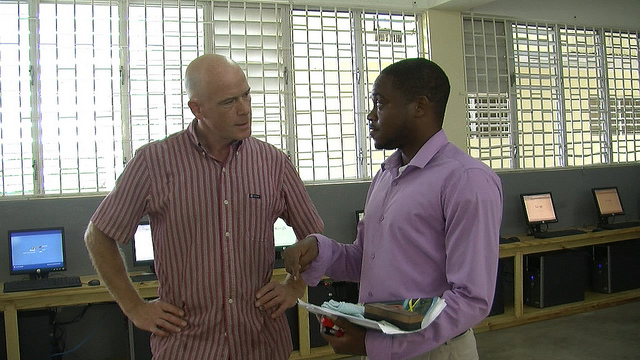Public universities have “really lost our focus”

Q&A with Christopher Newfield

Christopher Newfield
Since the 1970s, a “doom loop” has pervaded higher education, writes Christopher Newfield in his new book The Great Mistake: How We Wrecked Public Universities and How We Can Fix Them. Newfield, a professor of American Studies at the University of California, Santa Barbara, calls this loop “privatization” – the hidden and overt ways that “business practices restructure teaching and research.”
It’s a cycle in which colleges spend more and more money chasing research projects, building luxury dorms and academic centers to attract wealthy students, and engaging in activities that compel them to compete against each other, rather than focus on their own students. Newfield says he saw this first-hand while serving on the University of California’s planning and budget committee.
One consequence, according to Newfield: After decades of public universities raising tuition, legislatures have learned to rely even more on tuition increases to enable them to cut funding for public higher education.
Families suffer, of course, but the long-term impact transcends that. “The converting of public funding into higher tuition focuses the student on assuring her future income to cover higher costs and debt,” he writes. At stake, he believes, is a citizenry that sees college not as a place for in-depth learning and inquiry, but as a means to economic security, forcing colleges to conduct themselves more like a business, and less like a public good that all students can afford.
The Hechinger Report spoke with Newfield to learn more.
Society – culturally, economically and socially – gets the majority of the benefits. Here I’m using the work of some economists, particularly Walter McMahon, who has actually tried to count up all of the non-market benefits that universities generate.
My parents are first-generation college people, and they probably wouldn’t have gone if it hadn’t been free for them. The benefit of that was that society got two more productive, also politically more thoughtful, more complex people that had better health, people that were able to make contributions to their community, because they had incomes that allowed them to work only one job.
What’s happened since is, it’s just kind of an arrangement of convenience for state governments, for taxpayers, for business taxpayers, who’ve gotten a cheaper deal. But, it’s economically and socially less efficient to save money this way [by reducing state funding and relying on tuition plus businesslike revenue from research]. It’s also philosophically and economically incorrect.
Q: What’s one example of the way colleges have been behaving like businesses at the expense of students?
A: They had to look for multiple revenue streams really starting in the 1980s, and some of those were very high-value and glamorous … like technology-transfer revenues through patenting, increasing contracts and grants revenues, and increasing fundraising.
The national statistic is that universities have to put in 19 cents of institutional funds to make up, to get to a full dollar of their research expenditures. [And] this number is higher at public universities than it is at private universities. The last numbers that I saw are about 25 cents on the dollar of overall research expenditures at publics, and something like half that at privates. So there’s a public subsidy that’s going on at these institutions, through ongoing general fund contributions, that means that they’re just paying more of their own money … and not paying for what the public thinks it’s paying for, which is instruction, and some other kinds of core things.
There’s actually one article that was published on this in the general press that said on $3.5 billion in gross contract and grant revenues [at the University of California], they lose $720 million [in one year].
Q: Why were states increasing tuition – your book notes public colleges raised tuition by about 50 percent in the 1980s and 38 percent in the 1990s – even though, as you point out, state funding was growing slightly?
Because they were adding prestigious activities. And after U.S. News came in with [college] rankings in the late 1980s, it just really took off. Because they were having to compete for revenue, for overall amount of R&D expenditures, for selectivity rates, which were tied to the prestige of the faculty. … Bayh-Dole [legislation], in 1980, which is the door opening [for universities] to keep patenting revenues, was a driver that we haven’t talked about enough.
But I think some of it is just that it was more important to have a kind of a national profile than it was to do really good regional service. Shifting from regional service to national profile created competitive costs; you just tend to duplicate a lot of things that other people have. Then later, in the 1990s and 2000s, when you’re starting to compete for blue chip out-of-state students, the arms race in facilities accelerates, and just re-accelerates after 2008.
Q: What’s the most glaring example of privatization at work that you saw on the UC planning and budget committee?
A .We just started prioritizing private revenue streams, and energy and brains and additional positions were created in order to go after that other stuff. The Regents were pitched fundraising statistics and contracts and grants, gross statistics – always with the gross numbers, never with net. Undergraduates and academic graduates students became more of an afterthought at the senior management level. They were kind of the revenue source, in terms of tuition and general funds per capita, but then, after that, they were not at the center of policy. We really lost our focus.
Q: Let’s say there’s a reformer who’s sympathetic to the arguments in this book. Does she sit down with President-elect Trump? Or with her state’s governor? And what will that elevator pitch sound like?
She would say to Trump, you ran on making America great again. And to make America great again, you have to make the economy great again. And to make the economy great again, you have to bring all the non-college workers of the country into it. And to do that, to include the non-college, you have to rebuild open-access, high-quality, public universities. There is no other way. It can’t be job training. It can’t be political rhetoric. It can’t be browbeating a few companies to not off-shore their workers.
This has to be liberal arts and sciences. Rebuild high-end cognitive skills, so that these folks don’t just go down the street to the machinist shop that’s still open if they lost their factory job. They can be eligible for a whole range of jobs, or build jobs and businesses on their own with these skills.
This interview was conducted by telephone and lightly edited for length and clarity.
This story was produced by The Hechinger Report, a nonprofit, independent news organization focused on inequality and innovation in education. Read more about higher education.






